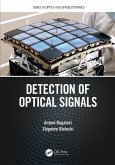This book covers the entire process of manufacturing of optical components and systems. It offers a comprehensive and extensive insight into the methods, principles, and underlying mechanisms/considerations of glass machining, optical fabrication, and design of optics.
Dieser Download kann aus rechtlichen Gründen nur mit Rechnungsadresse in A, B, BG, CY, CZ, D, DK, EW, E, FIN, F, GR, HR, H, IRL, I, LT, L, LR, M, NL, PL, P, R, S, SLO, SK ausgeliefert werden.









